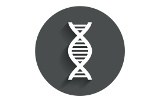
DNA polymérases for difficult templates
PCR is a well known and effective tool for amplification of DNA sequences of interest. When DNA sequences with a high GC content are amplified, the formation of PCR products can often be compromised by inadequate strand separation and by the propensity for the formation of complex secondary structures. The inability of the DNA polymerase to function through regions of strong secondary structure, such as "hairpins", often leads to the formation of truncated PCR products. In addition, poorly defined amplification products are prevalent when the primers are GC-rich. Despite the inherent challenges, the detection of GC-rich sequences is becoming increasingly important for the molecular diagnosis of hereditary diseases.
Successful amplification of difficult samples (eg, sequences containing GC-rich regions) often requires the addition of co-solvents (eg, dimethylsulfoxide (DMSO)) to lower the separation temperature of the DNA strand. However, this method has the disadvantage of inhibiting enzymatic activity and slowing the rate of extension - which is a problem if only a small amount of DNA is available.
We propose DNA polymerases with robust performance in a wide range of models rich in GC and AT. These DNA polymerases have improved tolerance to common PCR inhibitors for crude samples and / or DNA extractions.


